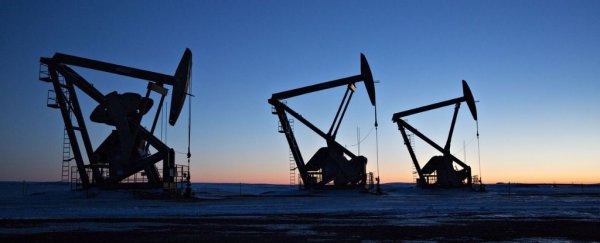If fossil fuel companies in the United States were made to pay for the real environmental and health costs of their products, a new model suggests it would set them back roughly $62 billion dollars every year.
Today, that huge sum of money is implicitly subsidized by taxpayers.
"Fossil fuel companies benefit in a big way because prices currently do not reflect the environmental and social costs associated with the production and consumption of fossil fuels," says economist Matthew Kotchen from Yale University.
"A change would really affect their bottom lines, and this study estimates how much."
Kotchen's assessment includes the natural gas, coal, diesel, and gasoline industries. Using data from 2010 to 2018, his model seeks to put a number on the financial benefits of current subsidies, while also estimating the true costs of fossils fuels in terms of environmental damage, health damage, and inefficient transportation practices.
In the end, those hidden costs are covered by taxpayers in various ways, including the medical costs associated with climate change and local pollution, infrastructure repairs to roads and bridges, and smog-contributing traffic congestion.
Meanwhile, companies themselves have largely washed their hands of the matter.
If natural gas and oil producers were made to pay instead of taxpayers, the costs would amount to 18 percent of their net income for the 2017-2018 financial year.
Coal producers, on the other hand, didn't even make enough money that year to pay for all the damages. In fact, Kotchen's model has found the benefits of implicit subsidies exceed the net incomes of half of all US coal companies, "in many cases by a wide margin."
"These numbers clarify why many in the fossil fuel industry oppose more efficient regulatory reform," writes Kotchen, "they may also shape the way policymakers view the prospects for additional subsidies going forward."
Petroleum producers appear to be the luckiest of the lot. Despite the fact that burning gasoline and diesel produces significant air pollution and is a major contributor to global warming, most petroleum companies have been able to evade responsibility for these consequences.
In 2018, findings from the model reveal both gasoline and diesel companies brought in a combined $45 billion in implicit subsidies. That same year, the coal industry got $9 billion on top of their net income, and the natural gas industry took in $17 billion in benefits.
Today, there are only a few large fossil fuel companies in the US, and these businesses tend to have their fingers in a variety of industries, which means their implicit subsidies are providing them huge advantages across the board.
In 2018, for instance, the full implicit subsidies for natural gas, gasoline, and diesel saved ExxonMobil $1.4 billion and saved Chevron $908 million. The coal company Peabody Energy Corp, on the other hand, received a whopping $1.56 billion slice of the subsidy pie.
Nor does this include the $33 billion of benefits to other oil producers and downstream suppliers of fossil fuels in the US retail markets.
In fact, this model only takes into account the consumption of gasoline and diesel and not the additional subsidies associated with other petroleum products, like heating oil and jet fuel.
"The producer-specific benefits, therefore, should be interpreted as an underestimate," Kotchen writes.
Compared to explicit subsidies in the US, which equal roughly $20 billion a year, implicit subsidies are not talked about nearly as much, although scientists and economists are trying to change this.
A recent estimate found implicit subsidies in 2011 amounted to about $800 billion globally. This is clearly a market failure, where real and substantial costs are not being taken into account. Kotchen's model is the first to trace the financial benefits back to specific producers.
"Hopefully these results will contribute to ongoing debates about climate and energy policy" says Kotchen, "and they may also shape the way policymakers view the prospects for additional subsidies going forward."
Before publishing his results, Kotchen reached out to all of the companies studied. None of them had anything to say on the matter.
The study was published in the Proceedings of the National Academy of Sciences.
